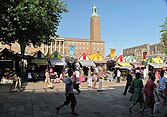Portal:Capitalism
The Capitalism PortalCapitalism is an economic system based on the private ownership of the means of production and their operation for profit. Central characteristics of capitalism include capital accumulation, competitive markets, price systems, private property, property rights recognition, voluntary exchange, and wage labor. In a market economy, decision-making and investments are determined by owners of wealth, property, or ability to maneuver capital or production ability in capital and financial markets—whereas prices and the distribution of goods and services are mainly determined by competition in goods and services markets. Economists, historians, political economists, and sociologists have adopted different perspectives in their analyses of capitalism and have recognized various forms of it in practice. These include laissez-faire or free-market capitalism, anarcho-capitalism, state capitalism, and welfare capitalism. Different forms of capitalism feature varying degrees of free markets, public ownership, obstacles to free competition, and state-sanctioned social policies. The degree of competition in markets and the role of intervention and regulation, as well as the scope of state ownership, vary across different models of capitalism. The extent to which different markets are free and the rules defining private property are matters of politics and policy. Most of the existing capitalist economies are mixed economies that combine elements of free markets with state intervention and in some cases economic planning. Capitalism in its modern form emerged from agrarianism in England, as well as mercantilist practices by European countries between the 16th and 18th centuries. The Industrial Revolution of the 18th century established capitalism as a dominant mode of production, characterized by factory work and a complex division of labor. Through the process of globalization, capitalism spread across the world in the 19th and 20th centuries, especially before World War I and after the end of the Cold War. During the 19th century, capitalism was largely unregulated by the state, but became more regulated in the post–World War II period through Keynesianism, followed by a return of more unregulated capitalism starting in the 1980s through neoliberalism. Market economies have existed under many forms of government and in many different times, places, and cultures. Modern industrial capitalist societies developed in Western Europe in a process that led to the Industrial Revolution. Capitalist economies promote economic growth through accumulation of capital, however a business cycle of economic growth followed by recession is a common characteristic of such economies. (Full article...) Selected article
Norwich Market (also known as Norwich Provision Market) is an outdoor market consisting of around 200 stalls in central Norwich, England. Founded in the latter part of the 11th century to supply Norman merchants and settlers moving to the area following the Norman conquest of England, it replaced an earlier market a short distance away. It has been in operation on the present site for over 900 years.
By the 14th century, Norwich was one of the largest and most prosperous cities in England, and Norwich Market was a major trading hub. Control of, and income from, the market was ceded by the monarchy to the city of Norwich in 1341, from which time it provided a significant source of income for the local council. Freed from royal control, the market was reorganised to benefit the city as much as possible. Norwich and the surrounding region were devastated by plague and famine in the latter half of the 14th century, with the population falling by over 50%. Following the plague years, Norwich came under the control of local merchants and the economy was rebuilt. In the early 15th century, a Guildhall was built next to the market to serve as a centre for local government and law enforcement. The largest surviving mediaeval civic building in Britain outside London, it remained the seat of local government until 1938 and in use as a law court until 1985. (Full article...) Selected biography
Murray Newton Rothbard (/ˈrɒθbɑːrd/; March 2, 1926 – January 7, 1995) was an American economist, economic historian, political theorist, and activist. Rothbard was a central figure in the 20th-century American libertarian movement, particularly its right-wing strands, and was a founder and leading theoretician of anarcho-capitalism. He wrote over twenty books on political theory, history, economics, and other subjects.
Rothbard argued that all services provided by the "monopoly system of the corporate state" could be provided more efficiently by the private sector and wrote that the state is "the organization of robbery systematized and writ large". He called fractional-reserve banking a form of fraud and opposed central banking. He categorically opposed all military, political, and economic interventionism in the affairs of other nations. According to his protégé Hans-Hermann Hoppe, "[t]here would be no anarcho-capitalist movement to speak of without Rothbard". Hoppe described Rothbard as leading a "fringe existence" in academia. He broke with Koch and joined Lew Rockwell and Burton Blumert in 1982 to establish the Mises Institute in Alabama. (Full article...) Selected quote
General imagesThe following are images from various capitalism-related articles on Wikipedia.
Did you know
CategoriesRelated portalsCapitalism topicsCapitalism .. Private property .. Economic freedom .. Laissez-faire .. British Agricultural Revolution .. Industrial Revolution .. Klondike Gold Rush .. Marketplace .. Money .. Wage .. Taxes .. Patent .. Capitalist mode of production .. Criticisms of socialism .. Corporate capitalism .. Democratic capitalism .. Anarcho-capitalism .. State capitalism .. Welfare capitalism .. Adam Smith .. Milton Friedman .. Ludwig Von Mises .. Murray N. Rothbard .. The Wealth of Nations .. The Protestant Ethic and the Spirit of Capitalism .. Capital and Interest .. Capitalism and Freedom .. American capitalism .. Ronald Reagan Things you can do Improve this portal! Associated WikimediaThe following Wikimedia Foundation sister projects provide more on this subject:
Discover Wikipedia using portals |















































